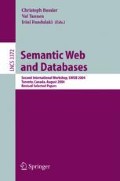Abstract
The problem of data semantics is establishing and maintaining the correspondence between a data source and its intended subject matter. We review the long history of the problem in Databases, and contrast it with recent research on the Semantic Web. We then propose two new directions for research on the problem and sketch some open research questions.
Access this chapter
Tax calculation will be finalised at checkout
Purchases are for personal use only
Preview
Unable to display preview. Download preview PDF.
References
Zelazny, R.: 24 views of Mount Fuji. Isaac Asimov’s Science Fiction Magazine 7 (1985)
Codd, E.: A relational model for large shared data banks. Communications of the ACM 13, 377–387 (1970)
Abrial, J.R.: Data semantics. In: Klimbie, K. (ed.) Data Management Systems. North-Holland, Amsterdam (1974)
Chen, P.: The entity-relationship model: Towards a unified view of data. In: Proc. International Conference on Very Large Databases, VLDB 1975 (1975)
Berners-Lee, T., Fischetti, M.: Weaving the Web: The Original Design and Ultimate Destiny of the World Wide Web by Its Inventor, Harper, San Francisco (1999)
Berners-Lee, T., Hendler, J., Lassila, O.: The semantic web. Scientific American (2001)
W3C: Web ontology language (owl) version 1.0 (2003), http://www.w3.org/tr/2003/wd-owl-ref-20030331
Ladkin, P.: Abstraction and modeling, research report RVS-Occ-97-04, University of Bielefeld, 1997; Technical report (1997), http://www.rvs.uni-bielefeld.de/publications/abstracts.html#AbsMod
Levesque, H.: Foundations of a functional approach to knowledge representation. Artificial Intelligence 23 (1984)
Borgida, A.: Description logics in data management. IEEE Transactions on Knowledge and Data Engineering 7, 671–682 (1995)
Reiter, R.: Towards a logical reconstruction of relational database theory. In: Brodie, M., Mylopoulos, J., Schmidt, J. (eds.) On Conceptual Modelling, pp. 191–233. Springer, Heidelberg (1984)
Miller, R., Haas, L., Hernadez, M.: Schema mapping as query discovery. In: Proc. International Conference on Very Large Databases (VLDB 2000), Cairo (2000)
Pottinger, R., Bernstein, P.: Merging models based on given correspondences. In: Proc. International Conference on Very Large Databases (VLDB 2003), Berlin, pp. 826–873 (2003)
Levy, A., Rajaraman, A., Ordille, J.: Querying heterogeneous information sources using source descriptions. In: Proc. International Conference on Very Large Databases (VLDB 1996), Mumbay, pp. 251–262 (1996)
Lenzerini, M.: Data integration: A theoretical perspective. In: Proc. International Conference on Principles of Database Systems (PODS 2002), pp. 233–246 (2002)
Friedman, M., Levy, A., Millstein, T.: Navigational plans for data integration. In: Proc. National Conference on Artificial Intelligence (AAAI 1999), pp. 67–73 (1999)
Madhavan, J., Halevy, A.: Composing mappings among data sources. In: Proc. International Conference on Very Large Databases (VLDB 2003), Berlin, pp. 572–583 (2003)
Fagin, R., Kolaitis, P., Popa, L., Tan, W.C.: Composing schema mappings: Second-order dependencies to the rescue. In: Proc. International Conference on Principles of Database Systems (PODS 2004), pp. 83–94 (2004)
Bernstein, P., Giunchiglia, F., Kementsietsidis, A., Mylopoulos, J., Serafini, L., Zaihrayeu, I.: Data management for peer-to-peer computing: A vision. In: Proc. SIGMOD WebDB Workshop, pp. 89–94 (2002)
Borgida, A., Serafini, L.: Distributed description logics: Assimilating information from peer sources. Journal of Data Semantics, 153–184 (2003)
Proceeding of semantic integration workshop, at ISWC2003, Sanibel Island, October 2003 (2003), http://ceur-ws.org/vol-82
Smith, B.C.: The correspondence continuum, TR CSLI-87-71, Stanford University. Technical report (1987)
Halevy, A., Ives, Z., Suciu, D., Tatarinov, I.: Schema mediation in peer data management systems. In: Proc. International Conference on Data Engineering, ICDE 2003 (2003)
Buneman, P., Khanna, S., Tan, W.C.: Why and where: A characterization of data provenance. In: Proc. International Conference on Database Theory (ICDT 2001), pp. 316–330 (2001)
Calvanese, D., De Giacomo, G., Lenzerini, M., Nardi, D., Rosati, R.: Data integration in data warehouses. Journal of Cooperative Information Systems 10, 237–271 (2001)
Velegrakis, Y., Miller, R., Mylopoulos, J.: Representing and querying data transformations. In: Proc. International Conference on Data Engineering, ICDE 2005 (2005) (to appear)
An, Y., Borgida, A., Mylopoulos, J.: Refining mappings from relational tables to ontologies. In: Proc. VLDB Workshop on the Semantic Web and Databases (SWDB 2004), Toronto (August 2004)
Mylopoulos, J., Bernstein, P., Wong, H.: A language facility for designing database-intensive applications. ACM Transactions on Database Systems 5, 185–207 (1980)
Barron, J.: Dialogue and process design for interactive information systems using Taxis. In: Proc. ACM SIGOA Conference on Office Information Systems, Philadelphia, pp. 12–20 (1982)
Greenspan, S., Mylopoulos, J., Borgida, A.: Capturing more world knowledge in the requirements specification. In: Proc. International Conference on Software Engineering (ICSE 1982), Kyoto, pp. 225–235 (1982)
Yu, E.: Modeling organizations for information systems requirements engineering. In: Proc. IEEE International Symposium on Requirements Engineering (RE 1993), pp. 34–41. IEEE Computer Society Press, San Diego (1993)
Castro, J., Kolp, M., Mylopoulos, J.: Towards requirements-driven software development methodology: The tropos project. Information Systems 27, 365–389 (2002)
Dardenne, A., van Lamsweerde, A., Fickas, S.: Goal-directed requirements acquisition. Science of Computer Programming 20, 3–50 (1993)
Author information
Authors and Affiliations
Editor information
Editors and Affiliations
Rights and permissions
Copyright information
© 2005 Springer-Verlag Berlin Heidelberg
About this paper
Cite this paper
Borgida, A., Mylopoulos, J. (2005). Data Semantics Revisited. In: Bussler, C., Tannen, V., Fundulaki, I. (eds) Semantic Web and Databases. SWDB 2004. Lecture Notes in Computer Science, vol 3372. Springer, Berlin, Heidelberg. https://doi.org/10.1007/978-3-540-31839-2_2
Download citation
DOI: https://doi.org/10.1007/978-3-540-31839-2_2
Publisher Name: Springer, Berlin, Heidelberg
Print ISBN: 978-3-540-24576-6
Online ISBN: 978-3-540-31839-2
eBook Packages: Computer ScienceComputer Science (R0)

